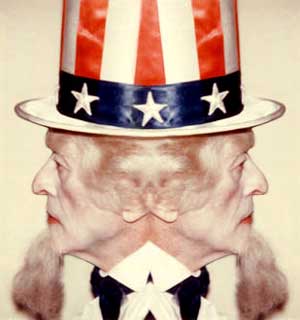
Warlords May Be Getting A Bad Rap
*********************************************
-Role Of Warlords In Anti-Terror War Reconsidered-
Original Source: The Washington Times
Via: World Peace Herald
By David R. Sands
Published June 3, 2006
-Washington--Warlords May Be Getting A Bad Rap-
Amid a furor over suspected U.S. payments to local militia leaders battling Islamists in Somalia, some policy analysts are arguing that not all warlords are created equal, and some may even be vital in advancing U.S. foreign policy goals.
John C. Hulsman, a researcher at the Heritage Foundation, and Alexis Y. Debat, a senior fellow at the George Washington University, Homeland Security Policy Institute, go even farther, saying some of America's most glaring recent policy reverses can be blamed in part on the failure to work with local warlords.
"When looked at in the glare of reality, America's state-building record in the Post-Cold War era is dreadful because of our reflexive antipathy for warlords and our unwillingness to co-opt them," they write in an essay for the Journal "The National Interest," to be published next week.
...Warlords have had a poor reputation with policy-makers, human rights activists and political scientists since the term was first coined to describe the regional power barons who divided and dominated China in the early decades of the 20th century.
Under the classic definition, warlords exercise de facto control of a portion of a nation-state, backed by a military force loyal to them and not to the central government.
The warlord question was back in the news this week in Somalia. The White House and State Department would not comment on reports of secret U.S. payments to an umbrella group of Somali warlords battling hard-line Islamist elements of the government in Mogadishu.
...Human rights groups have sharply criticized the warlords in Somalia, and a State Department political officer in charge of Somalia issues has been transferred after expressing his opposition to the payments.
But the warlords have provided real service to U.S. intelligence in the past: The Brussels-based International Crisis Group reported that one Somali warlord, Mohammed Dheere, helped U.S. agents capture Key al Qaeda operative Suleiman Ahmed Hemed Salim in 2003.
Asked about links to Somali warlords this week, State Department spokesman Sean McCormack would only say, "We certainly have active efforts working with the international community and working across a spectrum of Somalis to make sure that Somalia isn't a safe haven for terrorism."
Stanford University political scientist Jeremy Weinstein, who has studied conflicts across Africa, said some leaders once condemned as warlords proved to be forces for stability and eventual national unity, including the National Resistance Army in Uganda in the 1980s and the Eritrean People's Liberation Front in the 1990s.
But he said warlords had helped to undermine peace and stability in other instances, notably Congo, Sierra Leone and Liberia, "Where the barriers to entry are low."
"In those places, anybody with very little money could become a warlord," he said.
Mr. Weinstein said the situation in Afghanistan remains unclear, as some of the same warlords who helped install Mr. Karzai in power are trying to limit his power to govern beyond the capital of Kabul.
"In the short run, the warlords supported the U.S. aimes. In the long run, it isn't so clear," he said.
Source:
http://www.wpherald.com/storyview.php?StoryID=20060603-124515-4103r
No comments:
Post a Comment